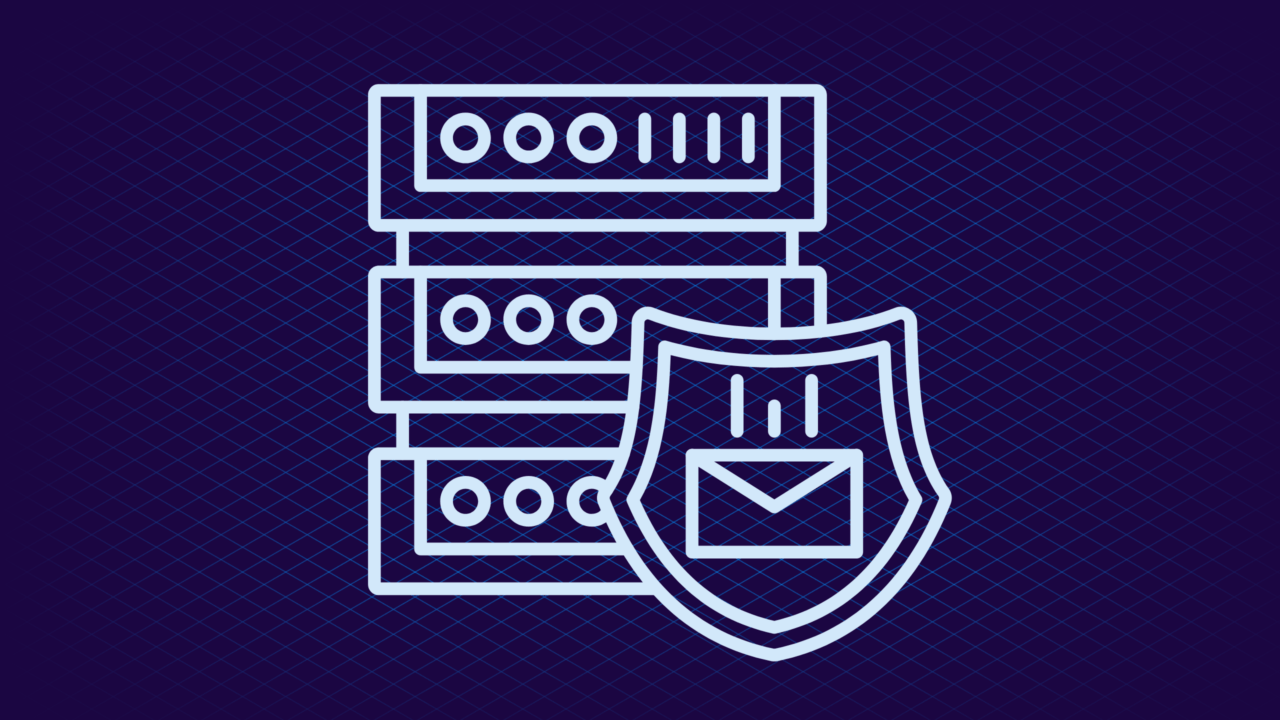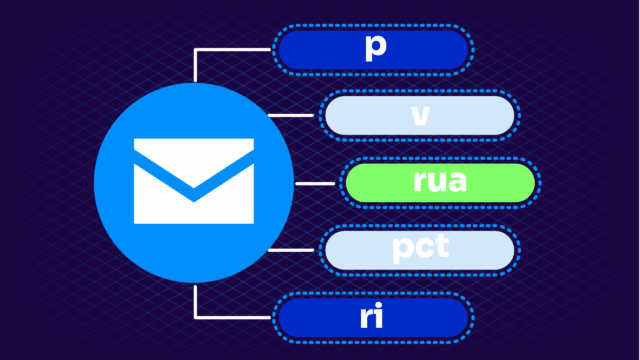Without email authentication, your email domain is probably getting spoofed right now. Seriously. It’s probably happening (or trying to happen) as you read this. And while everybody’s talking about AI and the latest security trends, they’re missing the fundamentals: like making sure someone can’t pretend to be you in an email.
We won’t beat around the bush. Implementing DMARC all on your own can be complicated and frustrating. The DNS records, the reporting, the implementation—it’s a lot. You’ve got a business to run, and you’re probably thinking: “Do I really need to learn another technical thing?”
The answer is no, you don’t. That’s where hosted DMARC comes in.
Email authentication isn’t sexy, but it’s the infrastructure that keeps your brand’s reputation intact. When someone can send emails pretending to be your company, that’s game over for trust. And trust is the ultimate currency in business.
Below, we’ll walk you through everything you need to know about hosted DMARC: what it is, what it does, when you should use it, and if it’s worth your hard-earned money.
What is hosted DMARC?
Hosted DMARC is a managed service that handles the implementation, monitoring, and maintenance of your DMARC email authentication policy. It eliminates all the technical complexity while protecting your domain from email spoofing and impersonation attacks.
We know you don’t wake up thinking about email authentication. Nobody does (except maybe us). Still, here’s the deal: if you’re sending emails, you need DMARC.
It’s what tells receiving mail servers, “Hey, this is actually coming from my company, not some scammer.” Unfortunately, setting up DMARC yourself is like trying to build your own car…yes, technically possible, but why put yourself through that pain?
Hosted DMARC takes all the technical work off your plate. Instead of you figuring out SPF records, DKIM signatures, and parsing those impossible-to-read XML reports, a service handles it for you. You get a dashboard, actionable insights, and someone else deals with the DNS headaches and those frustrating 10 DNS lookup limits that make traditional DMARC implementation a nightmare.
Think about it like this: You wouldn’t try to be your own lawyer or accountant if you’re running a serious business. The same principle applies here. Email authentication is a specialized skill, and hosted DMARC gives you access to that expertise without having to become an expert yourself.
The real value isn’t just saving time, though. It’s getting it right the first time. Because when DMARC goes wrong, your legitimate emails stop reaching people. And nothing kills your business faster than customers not getting your messages because you messed up some technical implementation.
Want to see where you stand? Start with Valimail Monitor: our free solution that checks your current email authentication status and shows you exactly what needs fixing. No strings attached.
The real-world problems hosted DMARC solves
Most companies are just one major spoofing attack away from serious damage to their brand. And when that happens, having “we were planning to get around to DMARC eventually” as your explanation isn’t going to cut it with your customers or your board.
Email security is all about preventing actual attacks that target your business every single day. Hosted DMARC solves specific problems that are costing companies millions and destroying brand trust:
- Domain impersonation attacks: When criminals send emails that look exactly like they’re from your company, tricking your customers, partners, and employees into giving up money or sensitive information.
- Technical complexity overload: DMARC implementation involves multiple technical components (SPF, DKIM, DNS records) that require specific expertise and constant maintenance (expertise most IT teams simply don’t have time to learn).
- The notorious 10 DNS lookup limit: SPF has a hard technical limitation of 10 DNS lookups that becomes a massive headache for companies with multiple email service providers, marketing tools, and cloud services.
- Report analysis paralysis: DMARC generates complex XML reports that are practically unreadable without specialized solutions.
- Visibility gaps: Without proper monitoring, you have no idea who’s legitimately sending email using your domain versus who’s trying to impersonate you.
- False positives: Incorrectly implemented DMARC policies can accidentally block your legitimate emails, destroying your deliverability and costing you business opportunities.
- Compliance headaches: Many industries now require email authentication as part of regulatory compliance with real consequences for failing to implement proper protection.
Who actually needs hosted DMARC?
Not everyone needs hosted DMARC. If you’re a tiny business with simple email needs and someone on your team who actually understands email authentication, DIY might work. But that’s not the case with a lot of businesses.
You absolutely need hosted DMARC if you’re running a complex email ecosystem. We’re talking about companies using multiple email service providers, marketing automation tools, CRM systems, support ticketing systems—all sending emails on your behalf. That 10 DNS lookup limit in SPF becomes your biggest problem, and hosted DMARC providers have built solutions specifically to solve this.
Organizations with limited technical resources are prime candidates, too. Your IT team is already stretched thin handling every other tech crisis that pops up. They don’t have time to become email authentication experts, monitor DMARC reports daily, and constantly update records as your email infrastructure changes.
Think about: When was the last time anyone at your company looked at a DMARC report? Exactly.
If your business depends heavily on email communication, you can’t afford to get this wrong. Financial services, healthcare, e-commerce and retail, SaaS companies: when your emails stop delivering because of a DMARC misconfiguration, you’re losing real money every minute until it’s fixed. Hosted DMARC gives you experts on call who’ve seen every possible implementation issue and can fix problems fast.
Companies with compliance requirements need this too. DMARC is increasingly showing up in regulatory frameworks and security compliance checklists. Having a managed solution means you can actually prove you’re following best practices when the auditors come asking.
If you’ve tried the DIY approach and failed (which happens way more often than people admit), it’s time to get help. Email authentication isn’t getting any simpler, and the scammers aren’t taking a day off. Sometimes the smartest business decision is knowing when to bring in specialists.
The pros and cons of hosted DMARC
There’s rarely a one-size-fits-all solution for everyone. Hosted DMARC has some advantages and disadvantages that you need to know before making the investment:
Pros
- Expertise on demand: You get access to specialists who live and breathe email authentication all day, every day. There’s no need to develop this specialized knowledge in-house.
- Time savings: Implementation that might take your team months can be completed in days or weeks. Valimail gets you to DMARC enforcement 4x faster than other vendors, and 8x faster than doing it on your own.

- Advanced reporting: Hosted solutions transform unreadable XML reports into actionable dashboards that actually show you who’s sending email as your domain.
- Scalability: Hosted DMARC solutions handle the scaling challenges without you having to redesign your authentication approach.
- Ongoing maintenance: Email sending services change and new marketing tools get added, but hosted solutions automatically adjust your authentication to accommodate these changes.
- Technical workarounds: Hosted providers have specialized solutions to overcome problems like 10 DNS lookup limits in SPF. Valimail’s Instant SPF® is a patented macro that provides a foolproof workaround to the DNS lookup limit.
- Support when things break: When legitimate emails stop delivering (and at some point, they will), you have experts to call who can diagnose and fix issues quickly.
Cons
- Subscription costs: You’re paying monthly or annually for something you could technically do yourself.
- Integration requirements: Some solutions require changes to your email sending infrastructure that might be challenging to implement in certain environments.
- Varying levels of service: Not all hosted DMARC providers are created equal. Some offer bare-bones services while others provide full management, hands-on service, and consulting.
- Learning curve: You still have some minimal responsibilities. It’s not a lot, but there’s still some knowledge required to use these platforms effectively.
Ultimately, you can do DMARC yourself. That’s not the question. More importantly, it’s whether that’s the best use of your limited time and resources.
How to know if hosted DMARC is worth the investment
Let’s start with the real cost of doing nothing. What happens if someone impersonates your domain and successfully phishes your customers or employees? The financial impact goes beyond direct fraud and includes: brand damage, lost customer trust, and potential regulatory fines.
One successful phishing attack can cost more than many, many years of hosted DMARC service.
Now look at your current resource allocation. How many hours is your team currently spending on email authentication? DIY isn’t free if it’s consuming valuable IT resources that could be focused on revenue-generating projects. Sometimes the most expensive solution is the one that eats up your team’s time.
Your email complexity matters, too. The more email senders you have (marketing platforms, CRM, support tools, etc.), the more value you’ll get from hosted DMARC. If you’re sending from more than 3-4 services, the complexity multiplies rapidly, and hosted solutions start making a lot more sense.
Be honest about your technical capabilities. Does your team have the expertise to implement and maintain DMARC correctly? Remember, mistakes don’t just mean incomplete protection—they can break your email delivery entirely. When must-see business emails stop reaching customers because of a misconfiguration, that downtime has a real cost.
Compliance requirements can tip the scales. If you’re subject to regulations that mandate email authentication (increasingly common), the cost of non-compliance might far exceed the investment in a hosted solution. Having a managed service gives you documentation and proof of best practices when the auditors come.
The question isn’t “Can we afford hosted DMARC?” but rather “Can we afford the consequences of getting email authentication wrong?” For most growing businesses sending important emails, that answer is pretty obvious.
Take the stress out of email authentication
Email security shouldn’t be a never-ending headache. You can keep wrestling with DIY DMARC—or you can talk to someone who solves these problems every day.
“In addition to their exceptional technology, Valimail’s customer support team deserves special mention. They have been responsive, knowledgeable, and highly professional in every interaction. Whether it was resolving technical queries or providing guidance on best practices, their team has consistently gone above and beyond to ensure our satisfaction.”
Lucas Ferreira Cunha, Chief Executive Officer (CEO) at Woffice
If your email setup is complex, messy, or just not working the way it should, we’ve got you.
Schedule a free 1:1 session with a DMARC expert, no pressure, no sales pitch. Just real help.



